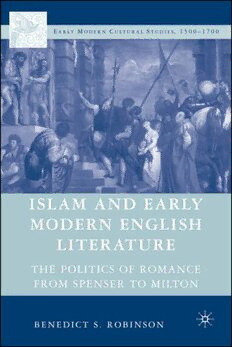
Islam and Early Modern English Literature: The Politics of Romance from Spenser to Milton PDF
249 Pages·2007·1.012 MB·English
Most books are stored in the elastic cloud where traffic is expensive. For this reason, we have a limit on daily download.
Preview Islam and Early Modern English Literature: The Politics of Romance from Spenser to Milton
Description:
Romance was the preeminent narrative form through which medieval Christendom imagined its encounter with the world. But in the early modern period, religious war and commercial and colonial expansion radically changed the terms of that encounter. This book traces the process through which Spenser, Shakespeare, Milton, and others adapted, revised, or resisted romance, mapping a world of increasingly uncertain allegiances and affiliations. Early modern romance re-imagined the world, and in the process decisively rearticulated the relations between ''Christendom,'' ''Islam,'' and ''Europe.'' By attending to genre, Robinson explores both the conflicts that formed early modern identities and the power of literary form to shape the world defined by those conflicts - a power with effects that reach to our present moment.
See more
The list of books you might like
Most books are stored in the elastic cloud where traffic is expensive. For this reason, we have a limit on daily download.
